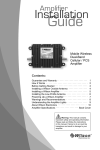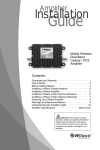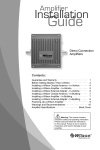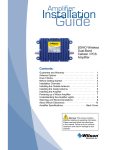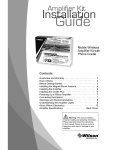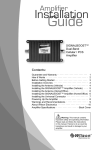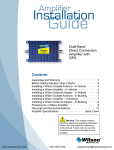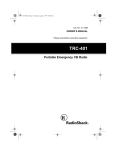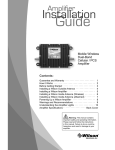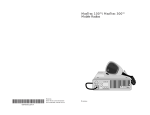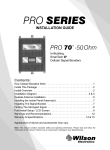Download Wilson Electronics 801241
Transcript
Amplifier Installation stallat stallatio Guide SIGNALBOOSTTM MOBILE PROFESSIONAL Dual-Band Wireless Cellular / PCS Amplifier with Built-in Antenna Contents: Guarantee and Warranty · · · · · · · · · · · · · · · · · · · · · · · · 1 How it Works · · · · · · · · · · · · · · · · · · · · · · · · · · · · · · · · · 2 Install Diagrams - Vehicle · · · · · · · · · · · · · · · · · · · · · · · · 3 Install Diagrams - In-Building · · · · · · · · · · · · · · · · · · · · · 4 Vehicle Installation - Antenna · · · · · · · · · · · · · · · · · · · · · 5 Vehicle Installation · · · · · · · · · · · · · · · · · · · · · · · · · · · · · 6 In-Building Installation · · · · · · · · · · · · · · · · · · · · · · · · · · 7 Powering Up a Wilson Amplifier · · · · · · · · · · · · · · · · · · · 8 Understanding the Amplifier Lights · · · · · · · · · · · · · · · · 8 Warnings and Recommendations · · · · · · · · · · · · · · · · · 9 About Wilson Electronics · · · · · · · · · · · · · · · · · · · · · · · · 10 Amplifier Specifications · · · · · · · · · · · · · · · · · Back Cover ! Warning: This manual contains important safety and operating information. Please read and follow the instructions in this manual. Failure to do so could be hazardous and result in damage to your amplifier. Wilson ® Electronics, Inc. 30-Day Money-Back Guarantee All Wilson Electronics products are protected by Wilson’s 30-day money-back guarantee. If, for any reason, the performance of any product is not acceptable, simply return the product directly to the reseller with a dated proof of purchase. 1-Year Warranty Wilson Electronics amplifiers are warranted for one (1) year against defects in workmanship and / or materials. Warranty cases may be resolved by returning the product directly to the reseller with a dated proof of purchase. Amplifiers may also be returned directly to the manufacturer at the consumer’s expense, with a dated proof of purchase and a Returned Material Authorization (RMA) number supplied by Wilson Electronics. Wilson shall, at its option, either repair or replace the product. Wilson Electronics will pay for delivery of the repaired or replaced product back to the original consumer. This warranty does not apply to any amplifiers determined by Wilson Electronics to have been subjected to misuse, abuse, neglect, or mishandling that alters or damages physical or electronic properties. RMA numbers may be obtained by phoning Technical Support at 866-294-1660. Operation is subject to the following two conditions: (1) This device may not cause interference, and (2) this device must accept any interference, including interference that may cause undesired operation of this device. Disclaimer: The information provided by Wilson Electronics, Inc. is believed to be complete and accurate. However, no responsibility is assumed by Wilson Electronics, Inc. for any business or personal losses arising from its use, or for any infringements of patents or other rights of third parties that may result from its use. Copyright © 2008 Wilson Electronics, Inc. All rights reserved. 1 Installation Instructions for the Following Wilson Amplifier: SIGNALBOOST MOBILE PROFESSIONAL Dual-Band Wireless Amplifier Part # 801240 Model # 271240 FCC ID: PWO271240SA IC: 4726A-271240SA The term “IC” before the radio certification number only signifies that Industry Canada technical specifications were met. Inside this Package Wireless amplifier Cigarette lighter power supply with USB connection USB power cable MagnetMini Magnetmount mount antenna antenna (certain kits) How it Works Your new Wilson amplifier has been carefully engineered to significantly improve the performance of your cell phone or cellular data card in mobile and in-building applications. Together with an outside antenna, the amplifier’s state-of-the-art technology is designed to increase your signal up to 6 times, reduce disconnects and dropouts, and increase data communication rates needed for 3G technologies. The outside antenna will collect the cell tower signal and send it through the cable to the amplifier. The signal is then boosted and sent through the built-in inside antenna. Your cell phone or data card then communicates with the improved signal. When the cell phone or data card transmits, the signal goes through the inside antenna, is boosted by the amplifier and broadcast back to the cell tower through the outside antenna. Wilson Electronics manufactures a wide variety of outside antennas to help you customize your amplifier for your specific application. Several are shown below. See your dealer or visit www.wilsonelectronics.com. Marine Antenna Dual-Band Trucker Mount Dual-Band NMO Mount Dual-Band 2 Before Getting Started This guide will help you properly install Wilson’s SIGNALBOOSTTM Mobile Professional DualBand Wireless Cellular/PCS Amplifier. It is important to read through all of the installation steps for your particular application prior to installing any equipment. Read through the instructions, visualize where all the equipment will need to be installed and do a soft installation before mounting any equipment. If you do not understand the instructions in full, seek professional help, or contact Wilson Technical Support at 866-294-1660. Installation Diagram - Vehicle Mobile Professional Amplifier Outside Antenna (mounted on vehicle) Cigarette lighter power supply Laptop USB Port USB Power Cable Vehicle Installation 1 Exterior antenna communicates with cell site. Amplifier boosts signal to and from cell site. 2 3 POWER TO AMPLIFIER Amplifier powered through vehicle cigarette lighter or USB port of laptop computer. 3 See detailed instructions on page 5 An in-building accessory kit is available from Wilson Electronics. It includes the window bracket antenna mount, and AC adapter, and a convenient travel case. Installation Diagram - In-Building Mobile Professional Amplifier Outside Antenna (mounted on window) AC power supply Laptop USB Port USB Power Cable In-Building Installation ! Warning: The outside antenna must have a separation of at least 8 inches from all persons during normal operation. See detailed instructions on page 6 4 Installing a Wilson Outside Antenna on a Vehicle To receive the best cell signal, select a location in the center of the vehicle’s roof 12 inches away from any other antennas and free of obstructions. Follow the specific antenna installation instructions included with the outside antenna (sold separately except for certain kits). The outside antenna must be installed vertically. Signal performance will be degraded if the antenna is not vertical. Optional MagnetMount Antenna Shown The antenna cable may be run through the door to the amplifier. ! Warning: The outside antenna and amplifier must have a separation of at least 8 inches from all persons during normal operation. Carefully Pull Down Door Seal 5 Run Cable Under Seal For a more professional-looking installation, the antenna cable may be run under the door seal. Carefully pull down the door seal. Run the cable through the seal and push the seal back into place. This prevents constant wear and tear on the cable as the door opens and closes. Installing a Wilson Mobile Professional Amplifier in a Vehicle The Wilson Mobile Professional Amplifier is designed for installation on the dashboard of your vehicle, using the supplied adhesive bracket. Attach the bracket in a suitable location to the right of the steering wheel. NOTE: Be sure to select a location for the amplifier that does not inhibit your ability to operate the vehicle safely. Once you have installed the bracket, attach the Mobile Professional Amplifier by aligning the hole on the back with the hook on the bracket. Grasping the sides of the amplifier, slide it downward approximately ¼ inch into place. Attaching the Antenna Run the cable from the outside antenna and attach it to the SMA connector labeled “antenna” on the amplifier. Be sure that the cable does not interfere with your ability to operate the vehicle safely. Alternative Amplifier Installation for Weak Signal Areas The Wilson Mobile Professional Amplifier performs better the closer it is to the cell phone (with minimum 8-inch separation). Thus, if you regularly drive through particularly weak signal areas, you should consider installing the amplifier on the back of the driver’s side headrest. To do so, attach a strip of Velcro (available at most hardware or fabric stores) to the back of the amplifier and adhere the matching strip to the back of headrest. Visually align the strips of Velcro and press the amplifier against the headrest so that it is held in place by the Velcro. Run the cable from the outside antenna and attach it to the SMA connector labeled “antenna” on the amplifier. Be sure that the cable does not interfere with your ability to operate the vehicle safely. 6 Installing a Wilson Outside Antenna in a Building Follow the specific antenna instructions included with the outside antenna (sold separately except for certain kits). These instructions assume that you are using a Wilson magnet-mount or mini magnet-mount antenna and the optional suction-cup window bracket. To receive the best signal, select a window on the side of your building where your outside signal is the strongest. Attach the suction-cup bracket to the inside of a window so that the cable will reach the amplifier location. Place the bracket as high on the window as possible for best performance. ! Warning: The outside antenna must have a separation of at least 8 inches from all persons during normal operation. Once the bracket is in place, attach the magnet base of the antenna to the flat surface of the bracket. Note: the antenna must be installed vertically. Signal performance will be degraded if the antenna is not vertical. Installing the Wilson Mobile Professional Amplifier in a Building The Wilson Mobile Professional Amplifier may be placed in any convenient indoor location, such as a desk or tabletop. The closer the cell phone or laptop data card is to the amplifier (with its built-in inside antenna), the better will be its performance. Attaching the Antenna Once you have selected the location for the amplifier, run the cable from the outside antenna and attach it to the SMA connector labeled “antenna” on the amplifier. Note: the amplifier and the outside antenna must have a minimum separation of 8 feet to prevent oscillation. 7 Powering up the Wilson Mobile Professional Amplifier In a Vehicle NT E NN A A Make sure the outside antenna cable is connected before powering up the amplifier. Carefully insert the USB power cable. Connect the mini-USB plug on the power cable to the amplifier port marked by the USB symbol. Connect the other end of the power cable to the USB port on the cigarette lighter adapter and insert the adapter into the cigarette lighter outlet of your vehicle. (If you are using a laptop to power your amplifier, insert the other end of the power cable into a USB port on the laptop and power up the laptop.) The amplifier may remain on all the time. However, leaving the amplifier on in a vehicle when it is not running can discharge the battery in a day or two. A good option is to power the amplifier through the ignition switch so the amplifier is turned on and off with the vehicle. In a Building Make sure the outside antenna cable is connected before powering up the amplifier. Connect the mini-USB plug on the AC adapter cable to the amplifier port marked by the USB symbol. Connect the other end of the cable to a standard AC power outlet. (If you are using a computer to power your amplifier, use the supplied USB cable.) IMPORTANT: Do not power up the amplifier unless the outside antenna cable is attached to amplifier. ! Warning: Use only Wilson cigarette lighter or AC adapters Understanding the Amplifier Lights If the light turns red, oscillation is occurring and the amplifier has powered down. The outside antenna needs to be moved farther from the built-in antenna in the amplifier. In a vehicle installation, move the outside antenna on the roof of the car to the rear of the car, but at least 8-12 inches from the rear or side windows. In a building installation, move the amplifier farther from the outside antenna. Remove power from the amplifier and reinstall power - this resets the amplifier. If the light is now green, the oscillation has stopped and the amplifier is working. If the red light is still on, move the antenna farther away and repeat the process. In a vehicle, always use a magnet-mount or roof-mount antenna. Do not use a glassmount antenna, as oscillation may cause continuous shut-down of the amplifier. An amber light indicates overload from the cell site. The amplifier has temporarily shut down and will automatically reset approximately 1,000 feet or more from the cell site. 8 Warnings and Recommendations Warning: Do not plug the amplifier directly into the cell phone or cellular data card using an antenna adapter. It will damage the cell phone or cellular data card. Warning: Do not plug in the DC power supply until the outside antenna cable is attached to the amplifier. Warning: RF Safety: The amplifier with its built-in antenna must be installed with a separation of at least 8 inches from all persons and must not be located in conjunction with any other antenna or amplifier. Warning: RF Safety: The outside antenna must be installed with a separation of at least 8 inches from any of the vehicle’s occupants or nearby persons and must not be located or operating in conjunction with any other antenna or amplifier. All roof-mount antennas should be centrally located on the roof of the vehicle. Use of this cellular amplifier with an antenna gain higher than 6.12 dBi is in violation of FCC regulations for which the offender is fully liable. All Wilson mobile antennas are 6.12 dBi or less. Separation of inside and outside antennas is very important. In a vehicle, the metal roof acts as a barrier and helps shield the two antennas from each other, preventing oscillation. If the vehicle has a sunroof, it is important to keep the outside antenna at least 12 inches from the edge of the sunroof. This prevents the amplifier from overloading or oscillating. 9 About Wilson Electronics Wilson Electronics, Inc. has been a leader in the wireless communications industry for nearly 40 years. The company designs and manufactures amplifiers, antennas and related components that significantly improve cellular telephone signal reception and transmission in a wide variety of applications, both mobile and in-building. With extensive experience in antenna and amplifier research and design, the company’s engineering team uses a state-of-the-art testing laboratory, including an anechoic chamber and network analyzers, to fine-tune antenna designs and performance. For its amplifiers, Wilson uses a double-shielded RF enclosure and cell site simulators for compliance testing. All products are engineered and assembled in the company’s 50,000-square-foot headquarters in St. George, Utah. Wilson has product dealers in all 50 states as well as in countries all over the world. 10 Amplifier Specifications Dual Band 800/1900 MHz Specifications 271240/801240 SMA Female 50 ohms 5.2 X 2.7 X 1.2 inch or 13.2 X 6.9 X 3.1 cm 3 oz or 83 Grams 824-894 MHz / 1850-1990 MHz Model Number / Part Number Connector Impedance (input/output) Dimensions Weight Frequency 1 Passband Gain (nominal) 800 MHz uplink 800 MHz downlink 1900 MHz uplink 1900 MHz downlink 2 40 dB (typical) / 46 dB (maximum) 42 dB (typical) / 49 dB (maximum) 44 dB (typical) / 50 dB (maximum) 43 dB (typical) / 50 dB (maximum) 20 dB Bandwidth (nominal) 800 MHz (uplink/downlink) 1900 MHz (uplink/downlink) Power output for single cell phone (uplink) CDMA GSM EDGE WCDMA 4 Power output (uplink) for multiple cell phones: Number of cell phones 2 3 4 5 6 Power output for single received channel (downlink) CDMA GSM EDGE WCDMA 47 MHz / 45 MHz (maximum) 101 MHz / 87 MHz (maximum) 800 MHz 24.6 dBm 25.2 dBm 25.3 dBm 23.0 dBm 1900 MHz 21.8 dBm 20.8 dBm 21.8 dBm 20.9 dBm Maximum Power3 800 MHz 1900 MHz 21.4 dBm 17.9 dBm 15.4 dBm 13.5 dBm 11.9 dBm 18.9 dBm 15.4 dBm 12.9 dBm 11.0 dBm 9.4 dBm 800 MHz 12.9 dBm 12.1 dBm 12.0 dBm 10.3 dBm 1900 MHz 11.1 dBm 11.0 dBm 10.8 dBm 11.5 dBm 4 Power output for multiple received channels (downlink). The maximum power is reduced by the number of channels: Maximum Power3 Number of channels 2 3 4 5 6 800 MHz 1900 MHz 10.5 dBm 7.0 dBm 4.5 dBm 2.5 dBm 0.9 dBm 8.7 dBm 5.1 dBm 2.6 dBm 0.7 dBm -0.9 dBm Noise Figure (typical) Isolation 3 dB nominal > 90 dB Power Requirements 5 - 8 V DC, 0.5A Notes: 1. Nominal gain is the maximum gain at any frequency in the passband. 2. Nominal bandwidth is the difference between two frequencies that are adjacent to the passband where the amplification is 20 dB lower than the passband amplification. One of the frequencies is lower than the passband and the other is higher. 3. The Manufacturer’s rated output power of this equipment is for single carrier operation. For situations when multiple carrier signals are present, the rating would have to be reduced by 3.5 dB, especially where the output signal is re-radiated and can cause interference to adjacent band users. This power reduction is to be by means of input power or gain reduction and not by an attenuator at the output of the device. 4. The maximum power for 2 or more simultaneous signals will be reduced by 6 dB every time the number of signals is doubled. Wilson® Electronics, Inc. Phone: 866-294-1660 www.wilsonelectronics.com Fax: 435-656-2432 Part #110543 - Amplifier Instructions Mobile Professional (ver 1)-006 / 09.08.08













